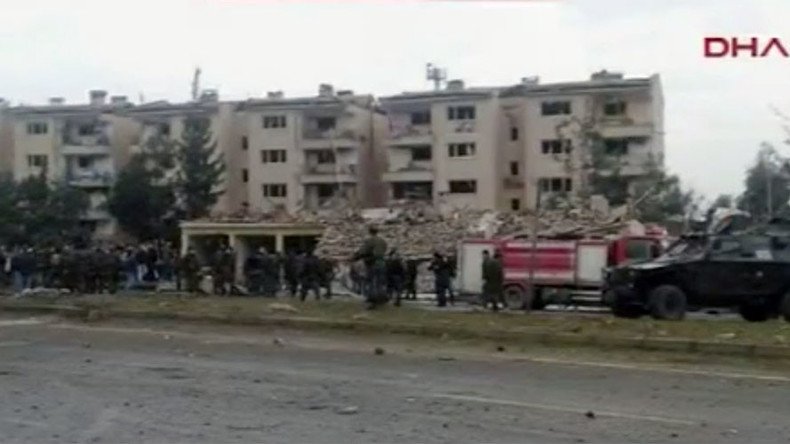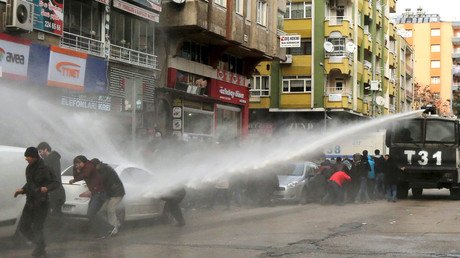2 policemen killed, dozens injured after bomb blast in south eastern Turkey

Two police officers have been killed and 35 people injured after a car bomb exploded in the south eastern Turkish province of Mardin. The attack has been blamed on the Kurdistan Workers Party, but no one has claimed responsibility so far.
The blast struck the town of Nusaybin, near the Syrian border, but no group has immediately claimed responsibility for the attack, Reuters reports. A small building next to the apartment block was partially flattened by the bomb, while a large crater appeared in the road. Windows in near-by buildings have all been blown out, due to the blast.
📌2.5x5x6 m3 crater, 2police killed/14 police+21civillians wounded.
— taylieli (@taylieli) March 4, 2016
Aftermath of pkk car bomb attack.#Nusaybinpic.twitter.com/6pnCAowOYn
The town has witnessed clashes between Turkish security forces and members of the Kurdistan Workers Party (PKK) over the last few days. The PKK are operating in four districts and have erected road blocks to stop Turkish security forces from entering, according to TASS.
In January, nine police officers and one civilian were injured after a bomb exploded near a police bus, causing the vehicle to collide with a nearby truck.
2 killed, 35 wounded in car #bomb attack in Nusaybin, #Turkeypic.twitter.com/JvQmwGXKxM
— Afshan Younus (@AfshanYounus) March 4, 2016
Tensions in Turkey escalated in July 2015 after at least 30 Kurdish activists, mostly students, were killed in a suicide blast in Suruc, a mainly Kurdish town on Turkey's Syrian border.
“Turkey has been waging an aggressive war against Kurdish civilians, not just Kurdish military personnel – they have been doing it for over 20 years, so there is a lot of long-standing bad blood between the Kurds and the Turks,” former CIA intelligence officer Larry Johnson told RT in February.
In August, the Turkish government launched a military operation in Kurd-majority areas predominantly in the south east of the country, imposing curfews and clashing with fighters of the militant PKK, which is considered a terrorist organization in Turkey.
On Wednesday, Turkish police used tear gas, water cannon and rubber bullets against demonstrators in Diyarbakir, as hundreds took to the streets to protest against the months-long curfews. A total of 33 people were arrested, according to Reuters.
The march was organized by a co-chair of the pro-Kurdish People’s Democratic Party (HDP), Selahattin Demirtas, who urged “all Diyarbakır people” to stop the “massacre” and “make a stand to lift the blockade in Sur,” Today’s Zaman reports.
In February, the Kurdistan Freedom Hawks (TAK), a splinter group of the PKK, claimed responsibility for a bombing in Ankara, which killed 28 people. The group said it carried out the attack to avenge the “defenseless and wounded civilians brutally massacred in basements in Cizre.”
“Everyone should know that those who ordered the massacre of civilians were responsible for the Ankara incident.”
Turkish President Recep Tayyip Erdogan promised to retaliate “everywhere” possible to avenge the deaths of those killed on February 17 and in previous attacks. Ankara blamed the attack on Syrian Kurds and used the bombing as an excuse to attack the Kurdish People’s Protection Units (YPG) militia forces in Syria, due to a perceived link between the PKK and YPG.
“Turkey has every right to conduct operations in Syria and the places where terror organizations are nested with regards to the struggle against the threats that Turkey faces,” Turkish President Erdogan was cited as saying by the Hurriyet newspaper.












